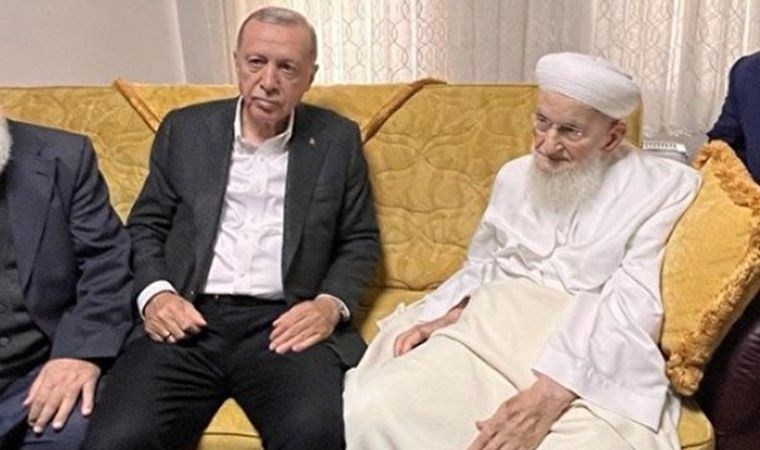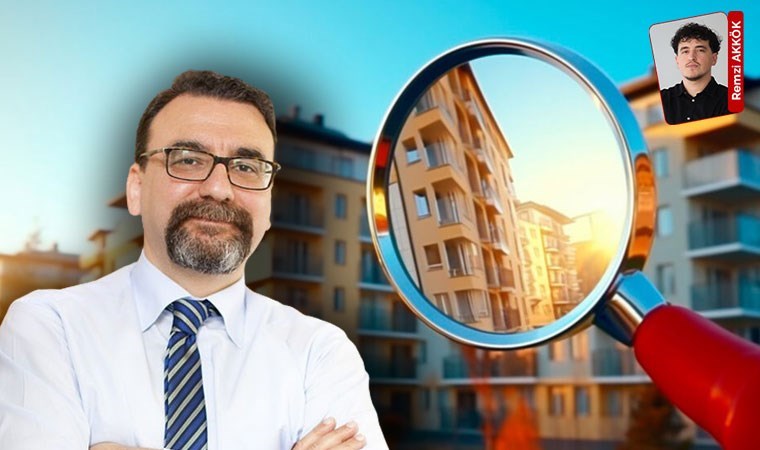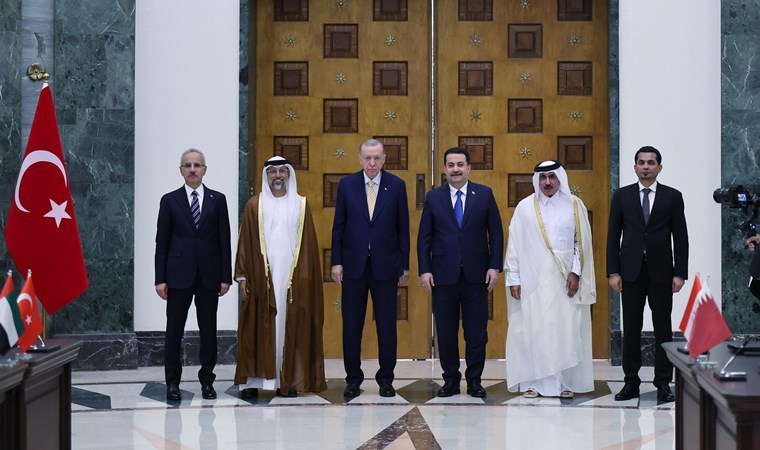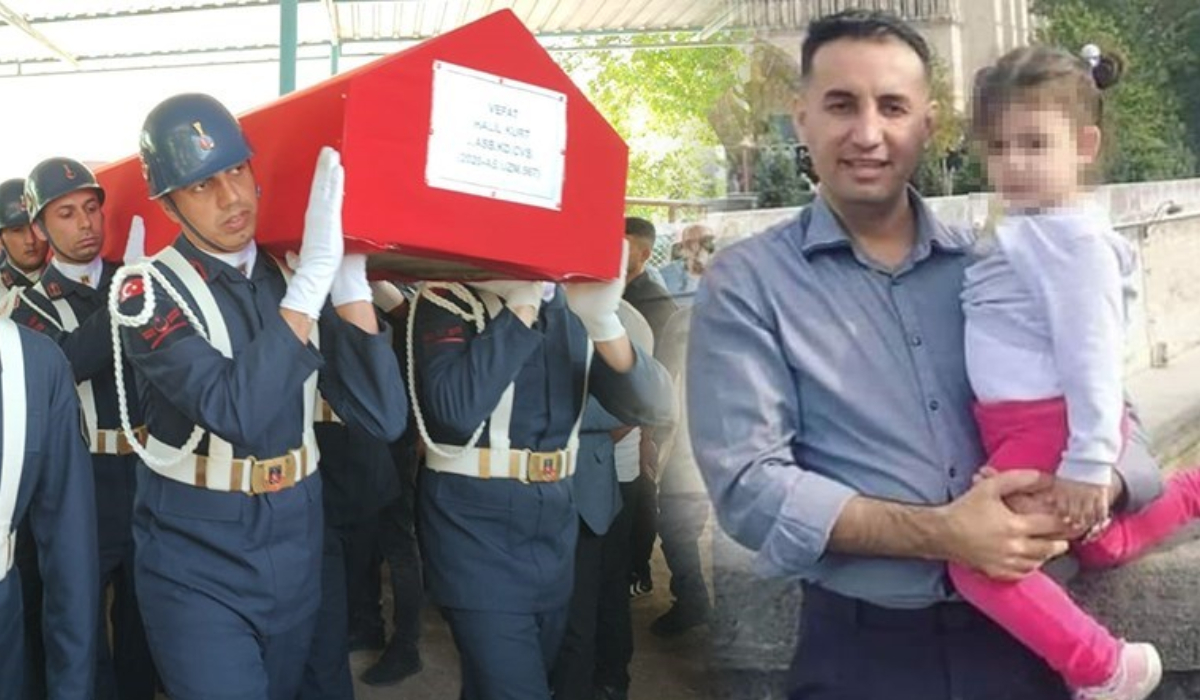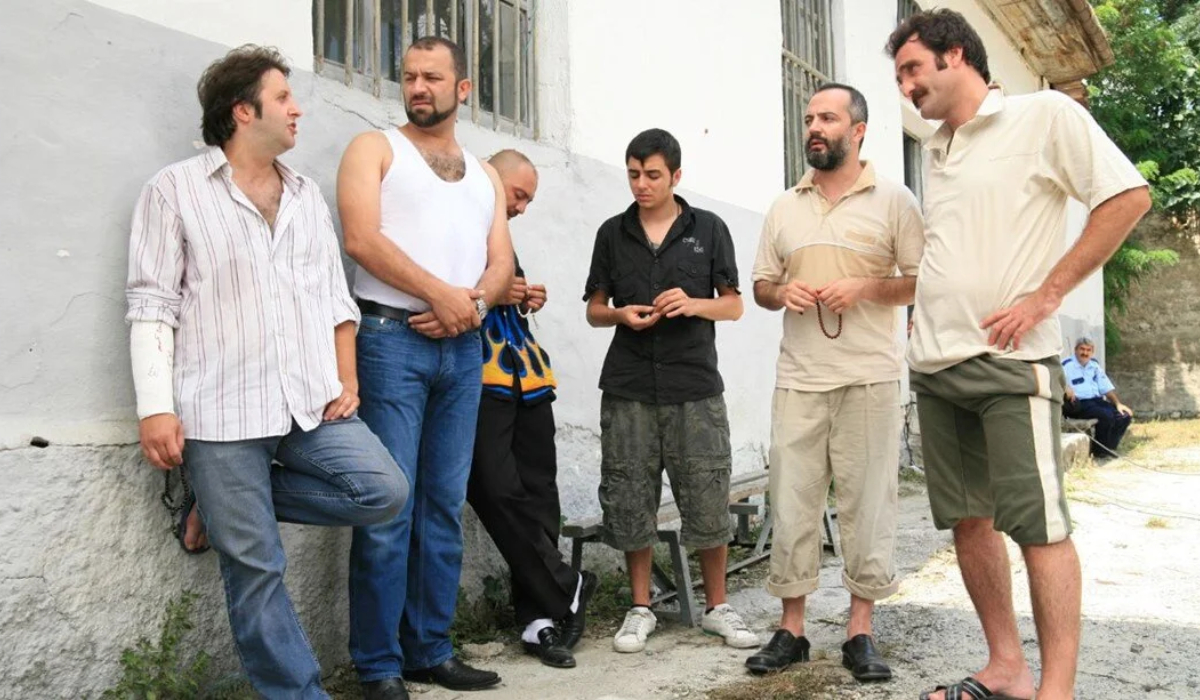Nuriye Gülmen, on hunger strike for 264 days, speaks to Cumhuriyet
Prior to the fifth hearing of her trial to be held today at Sincan Prison, Nuriye Gülmen gave handwritten replies to our questions from the hospital cell where she is being held, deprived of fresh air and daylight.
Gülmen says that she most misses her family, friends, the Human Rights Monument, Kütahya, the wind licking people’s faces as it passes, seeing a town from above, and also hugging her friends in struggle.
Şeyma Paşayiğit
The fifth hearing will be held today of detained academic Nuriye Gülmen, who turned the “I want my job back” action into a hunger strike and has maintained the strike for 264 days. Gülmen, who gave handwritten replies to Cumhuriyet’s questions, said with reference to the action she was staging that resistance was not a choice but a necessity, and stated that most of all she missed the sun. Gülmen, describing the case file against her as “rubbish,” stated that she could only end her hunger strike if restored to her job.
Gülmen replied to our questions as follows:
- Your action has lasted one year. What do you think about this one year? What have been the difficulties you have experienced over this process?
One year spent in resistance. Our hunger strike of more than 260 days. Detention that has exceeded six months. Prisons and hospitals. I could fill pages, books, talking about this one year. But, I will speak of a tiny thing. Last year, my birthday coincided with the 16th day of my resistance. I was having a meal following arrest time with my friends with whom for the most part I had just become acquainted. In the process, word got out at the meal that it was my birthday. They immediately made a few arrangements. A cake came following the meal. We staged a small celebration. This meant a lot to me. We resisters, Semih and I, blew out the candles together. A full year passed. We had spent 260 days in hunger. I was still a prisoner. I was in a hospital cell. My present this year was organised and staged in Yüksel Street. The Yüksel resisters knocked over the barricades “in honour of my birthday.” They staged a sit-down protest in front of the monument, that space that Semih and I first won - in front of the monument where we staged a sit-down protest with huge smiles on our faces. They have set up a police station in Yüksel – fat lot of good. The Yüksel resisters demolished the barricades in front of the police’s eyes – this was my very birthday present. This was not just my present if you take a hard look. This was a present given to everyone who is on this side of the barricade that resistance has set up and has taken small or large steps that strengthen the barricade, to everyone who believes in resistance. This is the spirit of Yüksel: intent, courage, loyalty, devotion, comradeship and collectivism. The kind of present they gave me was one I share with thousands of people, by its nature. This is a lovely thing.
‘Our case file is rubbish’
- Do you think the charges in your case file are adequate to warrant detention pending trial?
Our case file is rubbish. But, in political trials like ours, sufficient evidence, charges etc... These carry no weight. Things work through political decisions and instructions. I think that such questions are now very naive. You post a Tweet and you are detained. We live in such a country. We have just experienced it. Oğuz Güven is sentenced for making organisational propaganda for a Tweet that was live for 52 seconds. The prosecutor has submitted his opinion in our file – with neither I nor Acun having made our defences. The three of us are part of the same action. That is, we supposedly did the same things. Our placards and banners etc. Everything is the same. But, the prosecutor is seeking different sentences for the three of us. He wants Acun’s acquittal. Because we went on hunger strike, we are supposedly acting under the organisation’s instructions. A sentence for membership is sought for me because I acted far more under the organisation’s instructions. As to Semih, a sentence for a kind of aiding and abetting is sought. They were struggling so hard to create evidence against us that they brought a witness to testify against us at the third hearing. I was not at the hearing. Our lawyers proved at the hearing that the witness’s testimony was not reliable. The witness’s testimony collapsed. They brought another witness at the fourth hearing. The prosecutor read the opinion that he took out of his pocket without going to the trouble of listening to my lawyer’s statement about the witness or countenancing the possibility that the witness’s testimony would be rebutted at the hearing. What we have said or will say is of no consequence. He had made his decision before coming to the hearing. He came having drafted his opinion. Speak away to your heart’s content. The opinion is in his pocket! What is this the opinion on with me not having even made my defence? The prosecutor has no interest in procedural rules and so on. He wants to bring the proceedings to an immediate end. Let the sentences be handed down and this business end!
- You have also been put on trial for the press statement you made about Ali İsmail Korkmaz. What do you think about the way this prosecution is being handled?
Actually, the trial wasn’t filed over a press statement I made about Ali İsmail. This is a file made up of actions I took part in at the time of Gezi in which I was engaged in many things such as the Justice Watch and Justice March held for Ali İsmail and monitoring the Ali İsmail trial. There are a great variety of actions such as the Berkin Elvan action and protesting the routing of a road through the Middle East Technical University. This is part of the rulership’s attacks to end the hunger strike and resistance. Otherwise, what sense can there be in bringing a trial over an action that was staged four years ago?
‘I was prevented from defending myself’
- You were not brought to court to make your defence. Had you had the opportunity to appear before a judge, what kind of defence would you have made?
I prepared an inquisitorial, active defence prior to the first hearing. Why we were detained, why we were sacked, why we were resisting, why we were on hunger strike. It was a wide-reaching defence in which I examined matters such as this administration’s education policies and the destruction that imperialism is wreaking in the world. It got lost while I was being taken from one place to another. I do not have it now.
- What have hospital conditions and your state of health been like in the period until now? Minister of Health Ahmet Demircan has said that there can be forceful intervention if you lose your consciousness. What do you think about this?
I am currently being held in the section called the convict ward of Ankara Numune Training and Research Hospital. Prior to this, I was held without a carer for thirteen days in the intensive care unit in which third-degree intensive care patients are kept. Had it not been for the European Court of Human Rights’ intervention, I would also be held here without a carer. We are dealing with a force that thinks of my welfare to the extent that it can claim that somebody who is brought to hospital because their life is in danger on the 220th day of a hunger strike does not need a carer.
The cells in the convict ward are three-person. I am staying in the cell with my sister. This is in the building’s basement. It is impossible for us to get fresh and clean air in the cell. The air that comes in through the window fitted with two bars that you get onto a chair to open by two centimetres is certainly insufficient to ventilate the cell. You can have the air conditioning that operates extremely noisily turned on. If it is working! In our cell it does not. I mean, forget about ventilating the cell with fresh and clean air, we can’t even ventilate it with air conditioning. The lights are on above us day and night. The lights are controlled from the outside. So, we have to sleep at night with the lights on, too. Hence, I sleep very badly at nights. I cannot rest. I am also losing weight fast because of this. Only two of the cells here receive daylight. I was held for one month in a cell that receives no daylight. Then, one of the cells that receives natural light was vacated and I was moved there. I am talking about a cell in which you can come into contact with daylight to the extent that you can just distinguish between night and day between the two iron bars. By talk of receiving daylight do not imagine windows that fill the interior with sunlight.
Meetings with lawyers on a stretcher
I am able to speak for a limited time with my lawyers in a corridor with a warder constantly at my side and health workers passing by. I go out on a stretcher to meet with the lawyer. I cannot take notes. This does not afford a setting conductive to confidentiality. We can be monitored from the camera at the top of the corridor. So, I am able to exercise my right to a lawyer under restricted and burdensome conditions.
Family visits, in turn, are conducted under even worse conditions. They are not admitted to the corridor. I get to speak to them for 15-20 minutes from behind an iron-barred door. I am sitting on a stretcher again. The stretcher does not reach as far as the door. I can only speak to one person. To my mother or to my father. The lawyer or family member person who wants to visit first goes to the prosecutor and gets permission. Then they come to the hospital and get approval from the senior physician. They must keep on going through this procedure each visit. The person coming to visit me has to set aside their day for me. To get my clothes washed, I have to send them to the prison and my family have to collect them from there. Wash them and back to prison, and they send them here from there. My newspapers do not come on a daily basis. I have to read newspapers that have accumulated for two or three days. I can list many more things, but let this much suffice.
My health: of course, there are difficulties due to my hunger that has lasted for more than 260 days. Rapid weight loss, inability to rest, night-time insomnia. Most are actually difficulties related to the circumstances. I think that it will be better when I am released. But, whatever the situation, resistance is the main thing. When we embrace resistance, our health problems remain secondary.
Forceful intervention is murder. The doctors here say quite openly, “When you lose consciousness we will intervene with you.” Every day a phalanx of doctors visits me to ascertain if the conditions that would warrant intervention have come about. They ask if we want intervention, treatment or examination to be performed. I made it clear to them in the first days what their actions amounted to.
The Health Minister may speak as he does trusting their promises to intervene. The state may consider this an alternative to restoring us to our jobs, placing trust in these pronouncements. However, these doctors, if they do what is called and say “We cannot intervene. There is no patient-doctor relationship between Ms Gülmen and us. She does not accept us as doctors. Under these circumstances, to force ourselves on her as doctors is contrary to medical ethics. We are giving this task a miss,” the state will have to dispense with the possibility of forcible intervention. But, these doctors persist in behaving as if a patient-doctor relationship has been formed between us. They are tools of the state. My pronouncement in this regard is clear. I do not wish for there to be intervention when I lose consciousness. Those doctors who intervene will have committed a crime.
- Under what conditions will you give up the hunger strike?
It is impossible for me to give up the hunger strike without having a concrete gain. A result of a 260-day hunger strike must be a result consistent with resisting so many assaults. Our demand is clear and plain: We want our jobs back.
“I HAVE MISSED FRIENDS, YÜKSEL STREET, THE SUN AND THE WIND”
- What is the first thing you think of doing when you get out? What have you missed?
Hugging friends, embracing them, assuaging longing. My only wish is to be together with our people, our folk. And I want to see Yüksel Street. The monument. I cannot picture Yüksel with a police station set up there. I want to assuage my longing with our monument. And to be in Yüksel with its evening vendors’ stalls and to wander around the bookstalls. I miss people, my home town of Kütahya, being together with friends, going on nature walks and being in nature. The sun, the air, being in the open air, the wind, the wind licking people’s faces as it passes, seeing a town from above. Meeting up with and embracing my mother, my father, Semih, Esra, and Mehmet Güvel and Feridun Osmanağaoğlu, who shared our hunger, and assuaging the longing for them.
“Soylu did not stop at lying like a beginner”
- How would you reply to the booklet the Ministry of the Interior has brought out and Interior Minister Süleyman Soylu’s classification as a “terrorist” and allegations of “membership of a terrorist organisation?”
I have not had the opportunity to see the booklet Soylu has brought out. But I know that it is basically not a booklet that does anything to prove that we are members of an illegal organisation. It is a sign of helplessness. It can also be said to betoken the state’s helplessness in the face of our action demanding, “I want my job.”
In general, Soylu is trying to prevent people from standing by us. He says, “Look, these people are not innocent people like you imagine. Don’t stand by them.” He has said this countless times through various means and methods. Having people who stand by us and our lawyers detained and forbidding mention of our names number among these methods. To begin with, he lied “like a beginner” in the manner of his forefathers. He said, “They come in the morning, go home in the evening and eat.” With our emaciating bodies exposing his lies, he played demagogy about “terrorists” for all it was worth. In the end, getting no joy, he brought out a booklet. He pulled off a first in Turkey’s history.
Soylu’s panic measures were to no avail because we have strong ties with the people. For months, people witnessed us fighting there for our livelihoods and honour. We collected signatures in Yüksel Street when it was minus seven. We were there every day. Come snow, winter, storm. Our feet turned to ice, but we still handed out leaflets and sang songs. We reached out to thousands of people. We looked them in the eye and they touched our hands. They saw the light in our eyes. And our people know what it is to be deprived of their livelihoods. And didn’t they just know. They took us who were standing up for our livelihoods to their hearts. Let Soylu talk all he likes! We are these people’s kids and not the implementers of the AKP’s anti-people policies like him.
He must also know that there is no period of history in which the demands of the downtrodden have been considered legitimate and innocuous. With there being no period when the demanding of rights was considered to be innocuous, is this how the AKP rulership is going to consider it? Women’s right to vote, which everyone today considers to be a basic right, was won in America and England through long struggle. A woman sacrificed her life in England. She threw herself in front of the king’s horse with a placard in her hand at the horse races. She was demanding women’s right to vote with a placard. Those in power did not see this demand as being at all innocuous and made women pay every kind of price.

En Çok Okunan Haberler
-
 Emniyet müdürü kalp krizinden öldü!
Emniyet müdürü kalp krizinden öldü!
-
 Bahçeli, Bakan Mehmet Şimşek'i hedef aldı
Bahçeli, Bakan Mehmet Şimşek'i hedef aldı
-
 THY yöneticilerinin son maaşlarını açıkladı
THY yöneticilerinin son maaşlarını açıkladı
-
 Yeni 'şeyh' hayatını kaybetti
Yeni 'şeyh' hayatını kaybetti
-
 CEO’su istifa etti!
CEO’su istifa etti!
-
 Konut fiyatlarında iki yıl sonra ilk yaşandı
Konut fiyatlarında iki yıl sonra ilk yaşandı
-
 Erdoğan’dan ‘PKK’ mesajı
Erdoğan’dan ‘PKK’ mesajı
-
 Noter çalışanının dikkati dolandırıcılığı önledi!
Noter çalışanının dikkati dolandırıcılığı önledi!
-
 Fenerbahçe zirve yarışında yara aldı!
Fenerbahçe zirve yarışında yara aldı!
-
 19 yaşındaki oğlu 29 yaşındaki üvey annesiyle kaçtı!
19 yaşındaki oğlu 29 yaşındaki üvey annesiyle kaçtı!



